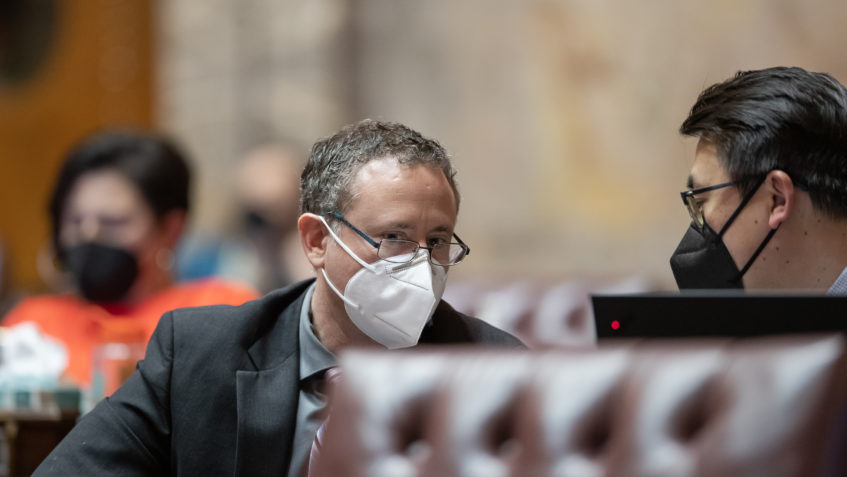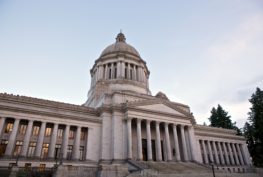Friends:
Though the COVID-19 pandemic presented enormous challenges to Washingtonians both at home and in the workplace, our state has weathered the hardships better than most if not all other states. As businesses closed and people faced losing their homes, we took swift and sweeping action to limit the damage and position our communities for a strong recovery.
In the early weeks of session, the Legislature passed a comprehensive, bipartisan $2.2 billion measure (HB 1368) to allocate mostly federal funds to expand testing and vaccine distribution, provide support to schools, make grants available for small business, and help thousands meet basic needs with housing and food assistance. Funding included:
- $618 million for vaccine administration, contract tracing and testing.
- $668 million for schools to resume in-person learning plus dedicated funding to help students catch up from learning loss during the pandemic.
- $365 million for rental assistance to help tenants and landlords impacted by the pandemic.
- $240 million for more than 12,000 small business assistance grants.
- $70 million to assist residents who do not qualify for federal or other state assistance.
- $26 million for food assistance to individuals and households in need.
- $50 million in grants to help childcare businesses stay open and expand capacity.
That was only a first step. The biennial operating budget amplified those efforts by:
- Providing $1.1 billion for additional vaccine distribution, tracing and testing.
- Making a landmark expansion of state funding for high-quality childcare and early learning through the Fair Start for Kids Act.
- Implementing the Working Families Tax Credit to put money back in the pockets of families who need it.
- Ensuring our schools have the resources necessary to reopen safely.
We also passed legislation to help employers hit hard by the pandemic by:
- Providing $1.7 billion in small business tax relief (SB 5061), plus another $500 million in targeted tax relief for employers in sectors that suffered the most pandemic-related layoffs (SB 5478).
- Exempting the B&O tax on Paycheck Protection Program aid (HB 1095).
- Reimbursing the cost of personal protection equipment (PPE) for health care providers. (SB 5169).
- Waiving liquor license fees for distressed bars and restaurants (SB 5272).
- Providing $1.6 billion in new federal and state housing investments to help thousands of families — many of whom struggled to keep up with mortgage and rent payments due to layoffs or reduced hours because of the pandemic — stay safe and healthy in their homes in communities across our state.
Preventing Evictions
When a public health crisis like a pandemic hits, tenants should not have to live in fear of an eviction nor should landlords have to fear losing their investments due to an eviction moratorium. Accomplishing these goals is easier said than done.
Of all the issues we dealt with this year, I found housing the most challenging. To help keep our households and businesses whole in the face of the pandemic, we spent a lot of money. Our budgets were robust this year, and the spending was our least bad option.
We learned from the Great Recession is that it’s important to keep money flowing through our economy. When the economy contracts and people get laid off, they spend less and more businesses go under, people can’t pay rent and become homeless, and landlords lose income and may sell rental units for conversion to owner-occupied units, further restricting rental housing supply and increasing remaining rents. Then tax revenues decline and we are less able to fund services during a period of high need. It becomes a vicious cycle. So spending money now to help people stay in their homes, make landlords whole, and support businesses prevents disruptions to the economy and makes sense. We will return to a healthier economy once we round the corner from the pandemic. In the end, tax revenues from a hot economy will help the state repay its bonds and the federal government to recoup its deficit spending if that is what it chooses to put its money towards.
Here’s how that thinking played out in landlord-tenant legislation this year:
- SB 5160 reformed landlord-tenant relations by providing for legal representation in evictions, an eviction resolution pilot program for nonpayment of rent, and landlord access to rental assistance and repayment programs. Washington state has had an eviction moratorium for nonpayment of rent since the early days of the public health crisis but that moratorium expires June 30. We worked hard to set up a system that will prevent a tsunami of evictions once the moratorium expires.
- Several other bills (SB 5235, SB 5287, HB 1236) will boost the affordable housing supply; create new tenant protections; expand and extend property tax exemptions to encourage more affordable housing; require landlords to provide a good cause with at least 60 days of written notice before an eviction, and eliminate 20-day no-cause evictions.
As you can see, a lot was done — but challenges remain. A wide range of resources is available through the state Department of Commerce that offer assistance to both renters and owners.
Sincerely,




